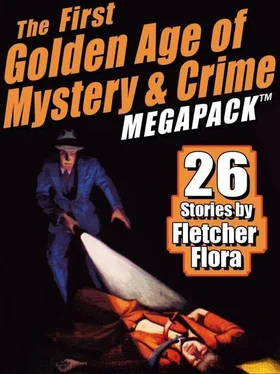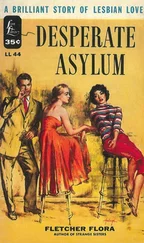It was then ten-o-five. When he reached the parking lot behind the Line Club, it was ten-thirty. About eleven, Campan had said. Carey left his own car by the lot exit and went across to Campan’s reserved slot and got into the front seat of Campan’s Caddy. He lit a cigarette with the dash lighter. A man and a woman came and got into a car and drove out of the lot. He sat and smoked and waited.
It must have been eleven when Campan came. Carey couldn’t see the face of his wrist watch, and the clock on the dash had quit running. Campan opened the door on the left side and slipped in under the wheel. He was smoking a cigar and had been drinking. He was heavy with the smell of rich Havana tobacco and rich Kentucky bourbon.
“How did it go?” he said.
“Fine. Everything went fine.”
Campan laughed. There was no other sound in the lot. There was no one else in the lot to make a sound. Just Campan, drop the Joseph, and Carey, his right arm.
“You’re a good boy, Carey,” Campan said. “Campan won’t forget it.”
“Thanks,” Carey said.
He took the .45 out of its holster and shot Campan twice. Campan’s body struck the door and arched upward in a violent reaction that drove the belly against the wheel, and then it collapsed with a great sigh and the head dropped back against the seat, and it looked for all the world as if Campan were catching forty winks, and that’s exactly what they thought at first when they found him later. Carey got out on his side and went back to his own car and drove to Campan’s apartment.
Phyl opened the door, just as she had opened it earlier, and this had the effect of completing the cycle nicely. She had been drinking alone and listening to tangos, and the last of the drinks was still in her hand, and the last of the tangos was still on the machine. Her eyes flared with pleasure that he had come and fear that he would be caught at it.
“Are you crazy?” she said. “Campan may be here any minute.”
He stepped into the room and closed the door.
“Campan won’t come,” he said.
“How do you know? Have you seen him?”
“I have. He’s dead.”
She stood looking at him, the blood draining from her face and returning slowly in two feverish spots high on the bones of her cheeks. She breathed deeply and very slowly, as if breathing were a great pain to her.
“Dead?” she said, “Campan dead?”
“Campan dead, the Swede dead. The Swede died first and left an empty place, and Campan was going to fill it, but now Campan’s dead too, and that still leaves the empty place for someone to fill. Guess who.”
“You? Carey Regan?”
“Campan said he had connections. He said he had strategy. Work and deals and waiting, he said. Was he the only one? Did he really think he was the only one? Working and dealing and waiting are things that anyone can do, even an odd-times guy, and it was his mistake if he never knew it.”
“Can you do it, Carey? Can you fill the place?”
“I can fill it. It’s fixed. Once it’s fixed, you move hard and fast, and that’s all of it.”
The spots were spreading and brightening in her cheeks. In her eyes was a gathering intensity of light. She seemed to be burning with a fever of excitement that would surely consume her and leave her a cinder.
“Carey,” she said. “Carey.”
He smiled at her thinly.
“Just call me Regan,” he said.
Originally published in Manhunt , August 1958.
A woman wanted to see me about a job. Her name, she said, was Faith Salem. She lived, she said, in a certain apartment in a certain apartment building, and she told me the number of the apartment and the floor it was on and the name and the address of the building it was in. She said she wanted me to come there and see her at three o’clock that afternoon, the same day she called on the telephone, and I went and saw her, and it was three o’clock when I got there.
The door was opened by a maid with a face like half a walnut. You may think it’s impossible for a face to look like half a walnut, and I suppose it is, if you want to be literal, but half a walnut is, nevertheless, all I can think of as a comparison when I think of the face of this maid. She wasn’t young, and she probably wasn’t old. She was, as they say, an indeterminate age. Her eyes smiled, but not her lips, and she nodded her head three times as if she had checked me swiftly on three salient points and was satisfied on every one. This gave me confidence.
“I’m Percy Hand,” I said. “I have an appointment with Miss Salem.”
“This way,” she said. Following her out of a vestibule, I waded through a couple acres of thick wood pile in crossing two wide rooms, and then I crossed, in a third room, another acre of black and white tile that made me feel, by contrast, as if I were taking steps a yard high, and finally I got out onto a terrace in the sunlight, and Faith Salem got up off her stomach and faced me. She had been lying on a soft pad covered with bright yellow material that might have been silk or nylon or something, and she was wearing in a couple of places a very little bit of more material that was just as shining and soft and might have been the same kind, except that it was white instead of yellow. Sunbathing was what she was doing, and I was glad. Her skin was firm and golden brown, and it gave the impression of consistency all over, and I was willing to bet that the little bit of white in a couple of places was only a concession to present company. Nine times out of ten, when someone tries to describe a woman who is fairly tall and has a slim and pliant and beautiful body, he will say that she is willowy, and that’s what I say. I say that Faith Salem was willowy. I also say that her hair was almost the identical color of the rest of her, and this seemed somehow too perfect to have been accomplished deliberately by design, but it may have been. You had to look at her face for a long time before you became aware that she was certainly a number of years older than you’d thought at first she was.
“Mr. Hand has arrived, Miss Faith,” the maid said.
“Thank you. Maria,” Faith Salem said.
I stepped twice, and she stepped twice, and we met and shook hands. Her grip was firm. I liked the way her fingers took hold of my fingers and held them and were in no hurry to drop them.
“Thank you for coming, Mr. Hand,” she said. “You must excuse me for receiving you this way, but the sun is on this terrace for only a short while each afternoon, and I didn’t want to miss any of it.”
“I’d have been sorry to have missed it myself,” I said.
She smiled gravely, taking my meaning, and then released my fingers and walked over to a yellow chaise lounge on which a white hip-length coat had been left lying. She put on the coat and moved to a wrought iron and glass table where there was a single tall tumbler with alternating red and yellow stripes. The tumbler was empty. Holding it against the light, she stared through it wistfully as if she were regretting its emptiness, and I watched her do this with pleasure and no regrets whatever. There is a kind of legerdemain about a short coat over something shorter. It creates the illusion, even when you have evidence to the contrary, that it’s all there is, there isn’t any more.
“I like you, Mr. Hand,” she said. “I like your looks.”
“Thanks. I like yours too.”
“Would you care for a drink?”
“Why not? It’s a warm day.”
“I had a gin and tonic before you came. Do you drink gin and tonic?”
“When it’s offered. A gin and tonic would be fine.”
She set the red and yellow tumbler on the glass top of the table and turned slightly in the direction of the entrance to the black and white tiled room.
Читать дальше












